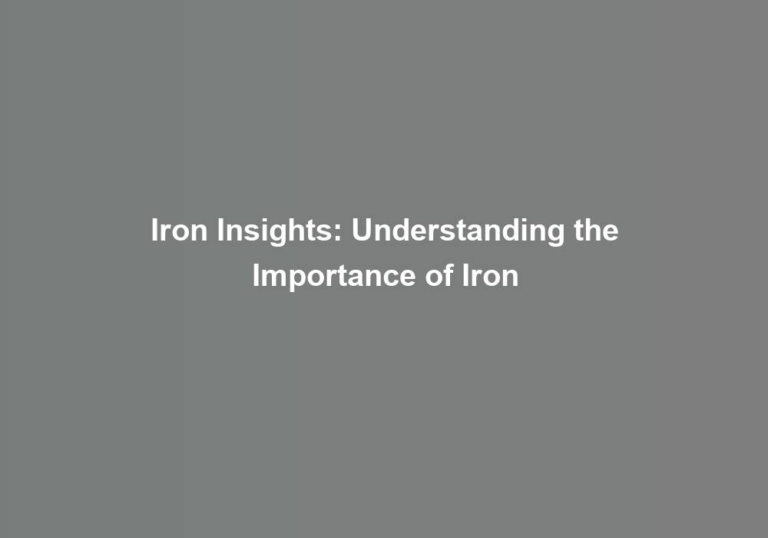The Crucial Elements: Exploring Key Minerals
Delving into the depths of the crucial elements, exploring key minerals can unlock a plethora of knowledge about the essential nutrients your body needs to function optimally. From calciumG??s pivotal role in bone health to ironG??s impact on energy levels, these minerals are the building blocks of a healthy lifestyle. But thereG??s more to uncover beyond the basics. As you navigate through the intricate world of minerals, youG??ll discover the intricate interplay between these elements and their profound effects on your overall well-being.
Importance of Key Minerals
Understanding the importance of key minerals is crucial for maintaining a healthy and balanced diet. Mineral deficiency can lead to various health risks, so itG??s vital to ensure that your body receives an adequate intake of these essential nutrients. Minerals play a significant role in the proper functioning of your body, from supporting bone health to enabling muscle contraction and maintaining fluid balance. Without sufficient minerals, your body may struggle to perform these vital functions, putting you at risk of developing health issues.
To prevent mineral deficiency, itG??s essential to consume a variety of foods that are rich in these essential nutrients. Incorporating dietary sources such as leafy green vegetables, nuts, whole grains, and dairy products can help you meet your mineral intake requirements. For instance, calcium, a crucial mineral for bone health, can be obtained from dairy products like milk, cheese, and yogurt. Meanwhile, magnesium, essential for muscle function and energy production, can be found in foods like nuts, seeds, and leafy greens. By diversifying your diet to include these mineral-rich foods, you can better ensure that your body receives the necessary minerals to support its functions and overall well-being.
Role of Calcium in Bone Health
You know that calcium plays a crucial role in maintaining bone density and strength. Your bodyG??s absorption of calcium is a complex process, involving various factors such as vitamin D and magnesium. Ensuring an adequate intake of calcium can have a significant impact on your overall bone health.
Bone Density and Calcium
Calcium plays a crucial role in maintaining and promoting healthy bone density. It is essential for bone strength and structure, and inadequate calcium intake can lead to decreased bone mineral density and an increased risk of fractures. To ensure optimal bone health, consider the following:
- Dietary Sources: Incorporate calcium-rich foods such as dairy products, leafy greens, and fortified foods into your meals.
- Calcium Supplementation: Discuss with your healthcare provider whether calcium supplements are necessary to meet your daily requirements.
- Regular Exercise: Engage in weight-bearing and muscle-strengthening exercises to support bone health and density.
Calcium Absorption Process
Supporting bone health and density, calcium plays a crucial role in the absorption process within your body. Dietary sources rich in calcium, such as dairy products, leafy greens, and fortified foods, provide the raw material for this essential mineral. Once ingested, calcium absorption primarily occurs in the small intestine through a complex mechanism involving vitamin D, parathyroid hormone, and calcitonin. In this process, specialized proteins facilitate the transportation of calcium across the intestinal membrane and into the bloodstream. The absorption mechanism ensures that an adequate amount of calcium is absorbed to meet your bodyG??s needs, especially for maintaining strong and healthy bones. By understanding the importance of dietary sources and the absorption process, you can take proactive steps to support optimal calcium levels and overall bone health.
Impact of Calcium
Playing a critical role in bone health, calcium contributes to the strength and density of your skeletal structure. HereG??s why calcium is so important:
-
Calcium supplementation, side effects: While calcium supplements can help meet your daily calcium needs, excessive intake may lead to side effects such as constipation or kidney stones. ItG??s crucial to consult with a healthcare professional before starting any supplementation.
-
Calcium rich foods, dietary sources: Incorporating calcium-rich foods like dairy products, leafy greens, and fortified cereals into your diet can help maintain optimal calcium levels. Consuming these foods provides essential nutrients and supports overall bone health.
-
Regular physical activity: Engaging in weight-bearing exercises and strength training can enhance calcium absorption and promote bone density, reinforcing the positive impact of calcium on your skeletal system.
Impact of Iron on Energy Levels
Iron plays a crucial role in maintaining your energy levels and overall well-being. When it comes to energy metabolism, iron is essential for the production of adenosine triphosphate (ATP), which is the primary energy currency in your body. Iron deficiency can lead to decreased ATP production, causing fatigue and lethargy. This can have a significant impact on your daily life, making it harder to stay focused and engaged in activities that you enjoy.
Iron deficiency is a common cause of low energy levels, especially in women of childbearing age. If you often feel tired and have difficulty concentrating, it might be worth checking your iron levels. Incorporating iron-rich foods such as lean meats, poultry, fish, lentils, and spinach into your diet can help boost your iron intake and improve your energy levels.
In addition to its role in energy metabolism, iron is also crucial for transporting oxygen throughout your body. Without enough iron, your body canG??t produce enough hemoglobin, the protein in red blood cells that carries oxygen. This can lead to feelings of weakness and shortness of breath, further impacting your energy levels and overall well-being.
Ensuring that you maintain adequate iron levels is essential for sustaining your energy levels and feeling your best. If you suspect that you may have an iron deficiency, consult with a healthcare professional to discuss testing and potential solutions. Taking proactive steps to address iron deficiency can help you reclaim your energy and vitality.
Benefits of Magnesium for Body Function
You know that magnesium plays a crucial role in muscle function, helping to regulate muscle contractions and relaxation. Additionally, magnesium is essential for energy production in the body, as it plays a key role in converting food into energy. So, as you explore the benefits of magnesium for body function, consider its impact on both muscle health and energy levels.
Magnesium and Muscles
Magnesium plays a crucial role in supporting muscle function and overall body health. When it comes to the well-being of your muscles, magnesium deficiency can lead to issues such as muscle cramps and spasms. Ensuring an adequate intake of this essential mineral can offer numerous benefits for your bodyG??s muscle function.
Here are three key ways magnesium supports your muscles:
- Muscle relaxation: Adequate magnesium levels help your muscles relax after contraction, reducing the likelihood of cramps and spasms.
- Energy production: Magnesium is involved in the production of ATP, the primary energy currency of the body, which is essential for muscle movement.
- Electrolyte balance: Magnesium helps maintain proper electrolyte balance, which is crucial for muscle function and preventing cramping.
Ensuring you have sufficient magnesium in your diet can contribute to the overall health and function of your muscles.
Magnesium and Energy
Supporting muscle function and overall body health, magnesium offers numerous benefits, including its role in energy production and body function. When it comes to energy, magnesium plays a vital role in the bodyG??s energy production process. It helps convert food into energy, making it essential for overall vitality and stamina. Furthermore, magnesium has been linked to improved sleep quality, as it helps regulate neurotransmitters that are responsible for promoting relaxation and quality sleep. Adequate levels of magnesium can also aid in stress management, as it supports the bodyG??s ability to cope with stress and anxiety. By ensuring you have sufficient magnesium in your diet, you are not only supporting your energy levels but also promoting better sleep and stress resilience, ultimately contributing to your overall well-being.
Significance of Potassium in Heart Health
Potassium plays a crucial role in maintaining heart health and function. As you explore the significance of potassium in heart health, itG??s important to understand how this mineral affects your overall well-being.
Here are three key points to consider:
-
Potassium Regulation: Your bodyG??s potassium levels are tightly regulated to ensure proper heart function. Potassium helps control the electrical activity of the heart, influencing its rhythm and ensuring that it beats in a coordinated and effective manner. Without adequate potassium levels, you may be at risk of irregular heartbeats or other cardiovascular complications.
-
Heart Rhythm: Potassium is essential for maintaining a regular heartbeat. It works in conjunction with other electrolytes, such as sodium and calcium, to support the heartG??s electrical impulses. Imbalances in potassium levels can disrupt this delicate balance, potentially leading to arrhythmias or other heart rhythm disturbances.
-
Overall Heart Health: Adequate potassium intake is associated with a lower risk of cardiovascular diseases, including high blood pressure, stroke, and heart disease. By including potassium-rich foods in your diet, such as bananas, sweet potatoes, and leafy greens, you can support your heart health and reduce the likelihood of developing these serious conditions.
Understanding the significance of potassium in heart health empowers you to make informed choices about your diet and lifestyle. By prioritizing potassium-rich foods and maintaining a healthy balance of essential minerals, you can actively contribute to the well-being of your heart.
Trace Minerals and Their Functions
Have you considered the role of trace minerals in supporting overall heart health, beyond the significance of potassium? When it comes to trace minerals, itG??s essential to understand their impact on your bodyG??s functions. Zinc plays a crucial role in supporting your immunity. It helps in the production and function of immune cells, which are essential for fighting off infections and keeping your body healthy. Without sufficient zinc, your immune system may be compromised, making you more susceptible to illnesses. Incorporating zinc-rich foods like legumes, nuts, seeds, and whole grains into your diet can help ensure that your immune system functions optimally.
On the other hand, copper is essential for metabolism. It aids in the production of energy in cells and helps maintain the health of your connective tissues. Additionally, copper is involved in the formation of red blood cells, which are vital for transporting oxygen throughout your body. A deficiency in copper can lead to fatigue, weakness, and problems with metabolic processes. Consuming copper-rich foods such as organ meats, seafood, nuts, seeds, and whole grains can support your bodyG??s metabolism and overall well-being.
Understanding the functions of trace minerals like zinc and copper is crucial for maintaining your health. Ensuring that you consume adequate amounts of these minerals through a balanced diet can contribute to your overall wellness and vitality.
Conclusion
So, now that you know the crucial role of key minerals in your health, are you ready to make sure youG??re getting enough of them in your diet? Remember, these minerals are essential for bone health, energy levels, body function, and heart health. Take care of your body by incorporating a variety of nutrient-rich foods into your diet. Are you up for the challenge? Your body will thank you for it!







